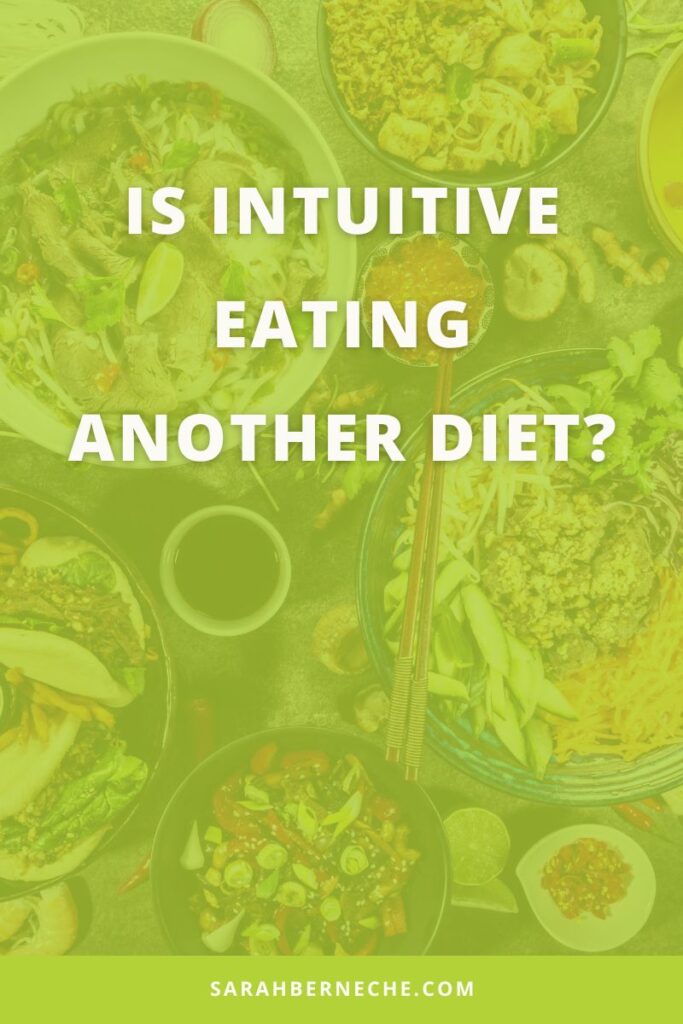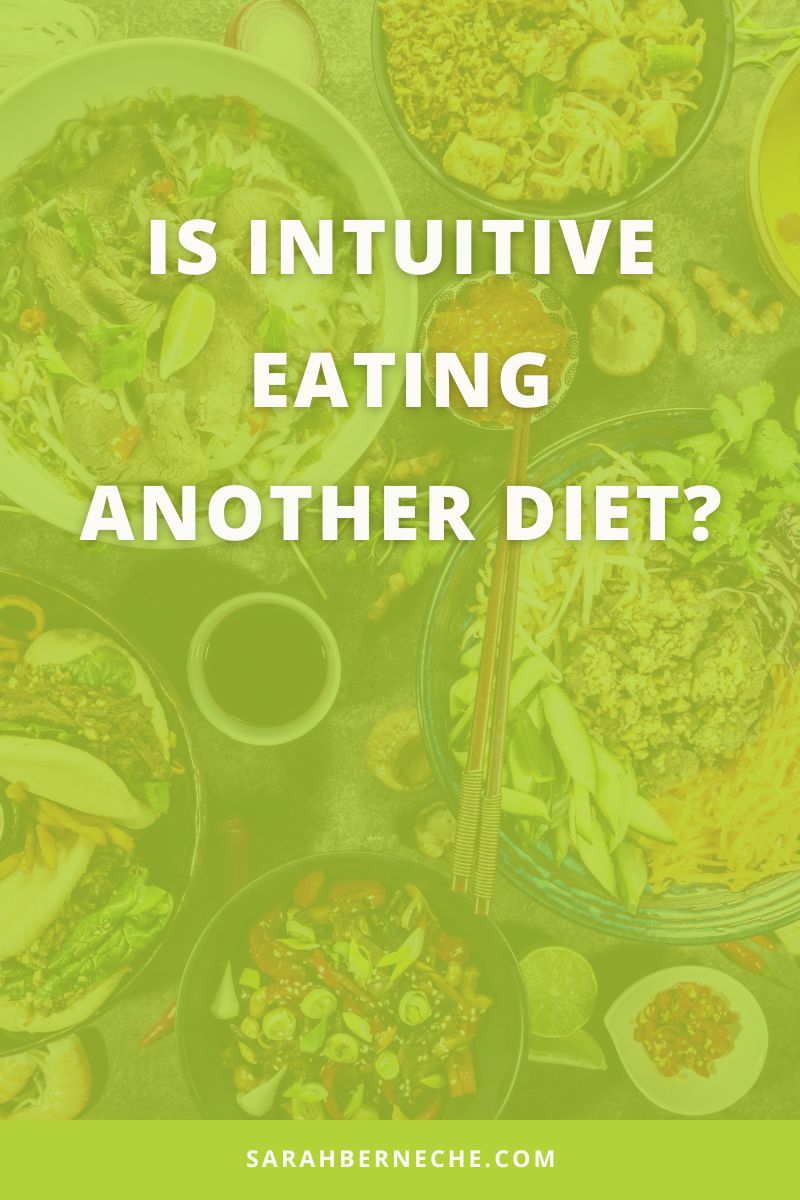Browsing the shelves of a local bookstore, I found the most recent edition of Intuitive Eating — sandwiched between a couple of diet books. With its signature 10 principles, hunger scale, and talks of normalizing “unhealthy” foods using a process called habituation, it’s easy to see how you could mistake Intuitive Eating for another diet.
This was Ali Francis’s experience when a therapist casually introduced her to the book. “At first I had a knee-jerk reaction, assuming it was just another diet out to undo the damage caused by all the other diets.”
When the diet mentality — thinking like a dieter, even if you’re not technically “on a diet” — is so thickly layered, it’s difficult to see the forest for the trees.
Maybe you have firm opinions about which foods are “good” or “healthy” and which foods are not. Perhaps you carry beliefs about portion size, snacking, eating after dark, take-out, convenience foods, carbs, and seed oils — ones you’re not even consciously aware of.
How do you know you’re wet if you’ve spent your entire life in the water? Can you even imagine what it feels like to be dry? When you grow up surrounded by diet culture, you don’t develop the “internal infrastructure” to consider life without it. It can seem like dieting is a benign, standard way of eating…even if it wreaks havoc on your psyche.
And because of the wellness industry’s influence, many diet ideas have been repackaged to us as “healthy eating.”
Things can get even more complicated if you’re a black-and-white thinker or a trauma survivor for whom nuance and flexibility do not come easily, if at all.
So is Intuitive Eating another diet? How is it different?

The goal of Intuitive Eating is to repair your relationship with food
Evelyn Tribole and Elyse Resch, two Registered Dietitians, created the model in response to what they saw in private practice. They’d develop beautiful meal plans for their patients to follow. Initially, people did lose weight — only to regain it all and blame themselves when they did.
Evelyn and Elyse acknowledged that the meal plans weren’t working. It didn’t matter if the plans weren’t overly restrictive. People either couldn’t stick to them or regained any weight they’d lost, even when they did. This is consistent with what we know about the realities of long-term weight manipulation. Yet, being Registered Dietitians, they didn’t want to throw out the role of nutrition altogether, either.
Intuitive Eating, formalized in the 1995 edition of the eponymous book, was developed as a bridge between the health community and the growing anti-diet movement. Instead of offering weight-loss tips and interventions, the framework was designed to help people heal their relationships with food, movement, and their natural body size.
The nutrition part? Instead of hyper-focusing on weight loss as the measure of good health, the 10 principles are based on cultivating sustainable health habits and behaviours.
Intuitive Eating has never been about intentional weight loss
Because of its relationship to the fat acceptance movement, weight loss has never been the focus of Intuitive Eating (despite some confusing messaging and problematic language use). Unlike diets and weight loss plans, Intuitive Eating supports people in making food decisions using a combination of instinct, reason, and emotion, or what Dan Siegel termed “mindsight.” In other words, Intuitive Eating is about connected eating. (Trauma note: those of you with a history of adverse events or trauma may have a difficult time with this. Processing trauma and building a wide window of tolerance in therapy may make this more accessible. I also incorporate Somatic Experiencing® and Internal Family Systems/Parts Work in my work for this reason.)
Dieting, on the other hand, is disconnected. You may make food decisions based on reason, independent of instinct or emotion. Alternatively, you may find you make many food decisions from emotion without considering how these foods may feel in your body. This can lead to chaotic eating patterns and conflicting thoughts about food.
For example, making “health-conscious” food decisions all day…only to feel out of control at night. Or sticking to a diet for a certain length of time only to throw in the towel and say “Screw it!” when you find yourself taking a bite of something “bad.”
200+ studies back Intuitive Eating
Many people don’t know this, but Intuitive Eating is supported by 200+ studies spanning 25+ years. Unlike today’s popular diets, Intuitive Eating is evidence-based. While I’m always skeptical of studies generally (how were they funded? Which researchers were involved? Who made up the sample size?), I do think 200+ is meaningful.
Listen: Much of the health and wellness information circulating today is much sexier and more compelling than Intuitive Eating. A lot of it may even “make sense.” But if any of these diets “worked,” they would have significantly more evidence behind them… and would be radically different from their previous iterations. For all the decades dieting has existed, we still don’t have a population of mostly thin people.
As Aubrey Gordon beautifully details in the newly released documentary Your Fat Friend, the diet/wellness industry essentially repackages the identical four or so diets…none of which have been proven effective over the long term (and may even contribute to serious harm).
When Intuitive Eating still feels like a diet
Okay, Intuitive Eating isn’t a diet. Then why don’t I feel like an Intuitive Eater?
Broadly speaking, the difference between people who can learn about Intuitive Eating and implement it versus those who know about it and struggle comes to two “buckets” in my experience: a) the amount of stigma and discrimination they face and b) the nervous system.
Not everyone will recover from dieting or disordered eating for a host of reasons. I truly believe everyone has the potential to heal; I don’t think I could do my work ethically if I believed otherwise. But as I’ve long said, I do think Intuitive Eating or diet recovery is more complex and potentially more challenging for those directly impacted by weight stigma (interpersonal and institutional weight-based discrimination), as well as those who already experience multiple levels of marginalization. I also think this work, when coupled with intersectional body image work, has the power to be incredibly liberating.
Next, the autonomic nervous system. Flexible thinking is powered by the parasympathetic nervous system (specifically something called the ventral vagal complex in Polyvagal Theory or “rest-and-digest”). When you don’t have enough access to ventral vagal (which can occur if you have a history of trauma or adverse events, including birth trauma, attachment injury, and intergenerational trauma) or have experienced chronic stress, you may have less access to this “fuel source.”
When you have less access to ventral, you might find it challenging to think in the gray. Nuance, flexibility, and the middle ground may feel like unfamiliar territory to you.
When you don’t have access to this fuel source, you might turn the 10 principles into a set of rigid rules to follow.
You might struggle to eat a variety of foods, believing that having a salad means you’re still dieting or that you should eat only “non-diet” foods if you’re genuinely an Intuitive Eater.
You might find it difficult to honour your hunger if you’ve recently eaten…or to stop eating at comfortable fullness without it feeling like restriction.
Maybe you try to perform Intuitive Eating “perfectly,” only eating at the “right” hunger level and always aiming to stop at “perfect fullness.” Intuitive Eating starts to feel like the hunger-and-fullness diet.
Or maybe when you get around certain foods, you might find you can’t stop eating them — even after keeping them around in your house for several weeks.
The beautiful thing? You can develop a more flexible nervous system and gain greater access to ventral. To do this, you need more co-regulation and ongoing regulation — and time away from dieting.

Comments +